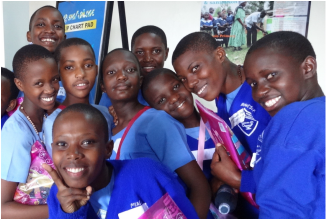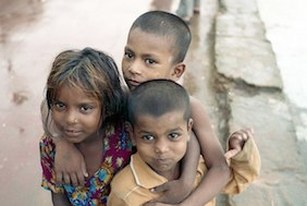
When it comes to dealing with their periods, the three biggest concerns for girls in Uganda are: 'Can't afford sanitary products'; 'Fear that boys will make fun of me'; and 'Lack of menstrual health education'. But the state of school toilets was also a major issue, with 62% of girls questioned saying they were too dirty, too crowded and lacked water for washing.
These are some of the results of Faith in Water's consultations on menstrual health with faith groups in Uganda. Although the Ugandan government and other NGOs have been working to push menstrual hygiene management higher up the agenda for schools, this is the first time that faith groups have been engaged on this issue.
Faith in Water is developing a toolkit for faith schools on how to help girls manage menstruation safely and with dignity – important given the mounting research that shows girls often miss school during their periods, with potentially devastating impact on their education and future life chances.
We held nine workshops in April 2016 to find out what girls' and schools' challenges were, and to discuss the importance of good menstrual health teaching to girls' education. We were delighted with the response from faith leaders, faith women's groups, heads and teachers of faith schools, who all agreed this was a serious issue that needed to be taken seriously by faith groups (who are involved in over half of schools in Uganda).
As Rev Canon Diana Nkesiga said it was time to let go of outdated ideas about stigma and shame: 'Church schools should be exemplary places of teaching dignity and hygiene.'
Balinda Sirag, of the Uganda Muslim Youth Assembly, said: 'Before I got involved, I used to think this issue is not important. Now I know it is very, very important. We must break the silence on menstruation and keep girls in school.'
We were also delighted by the response of Angela Nakafeero, Gender Techical Adviser with the Ministry of Education, Science, Technology and Sports, who said of Faith in Water's planned toolkit for faith schools: 'We are looking forward to this toolkit for religious schools. It is very exciting for us. We feel that this contribution will complement some of our interventions.'
To read the full report, including findings of girls' experiences of menstruation and challenges facing schools, download it here.
These are some of the results of Faith in Water's consultations on menstrual health with faith groups in Uganda. Although the Ugandan government and other NGOs have been working to push menstrual hygiene management higher up the agenda for schools, this is the first time that faith groups have been engaged on this issue.
Faith in Water is developing a toolkit for faith schools on how to help girls manage menstruation safely and with dignity – important given the mounting research that shows girls often miss school during their periods, with potentially devastating impact on their education and future life chances.
We held nine workshops in April 2016 to find out what girls' and schools' challenges were, and to discuss the importance of good menstrual health teaching to girls' education. We were delighted with the response from faith leaders, faith women's groups, heads and teachers of faith schools, who all agreed this was a serious issue that needed to be taken seriously by faith groups (who are involved in over half of schools in Uganda).
As Rev Canon Diana Nkesiga said it was time to let go of outdated ideas about stigma and shame: 'Church schools should be exemplary places of teaching dignity and hygiene.'
Balinda Sirag, of the Uganda Muslim Youth Assembly, said: 'Before I got involved, I used to think this issue is not important. Now I know it is very, very important. We must break the silence on menstruation and keep girls in school.'
We were also delighted by the response of Angela Nakafeero, Gender Techical Adviser with the Ministry of Education, Science, Technology and Sports, who said of Faith in Water's planned toolkit for faith schools: 'We are looking forward to this toolkit for religious schools. It is very exciting for us. We feel that this contribution will complement some of our interventions.'
To read the full report, including findings of girls' experiences of menstruation and challenges facing schools, download it here.

 RSS Feed
RSS Feed
